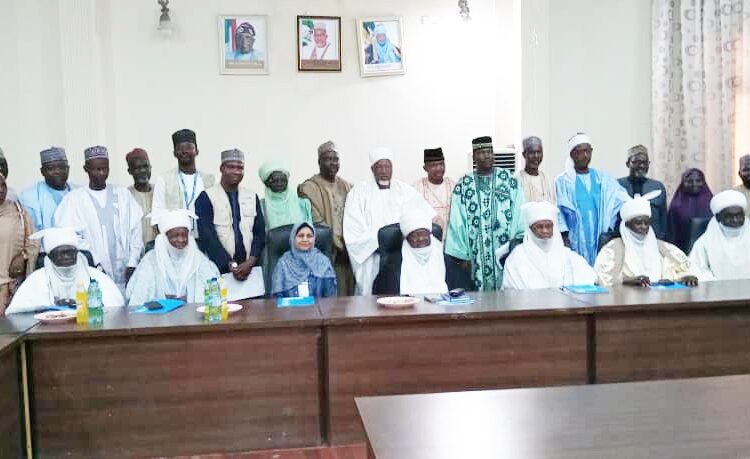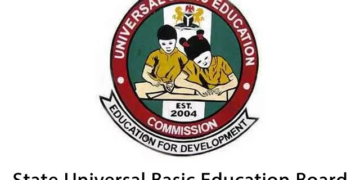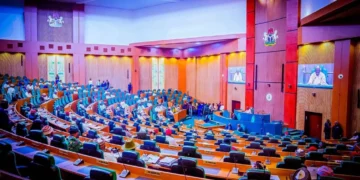The Council of Emirs in Bauchi has expressed readiness to support the state government and development partners in the crusade of returning the remaining 680, 000 out-of-school children and dropouts across the state to school.
The chairman of the council and Emir of Bauchi, Alh. Rilwanu Sulaiman Adamu gave the assurance on Saturday at a one-day consultative meeting on the 2024/25 Enrolment Drive Campaign (EDC) for out-of-school students.
The consultative meeting was organised by the State Basic Education Board (SUBEB) in collaboration with the council of traditional rulers and UNICEF Bauchi Field office at the emir’s palace in Bauchi.
The traditional ruler, who stressed the need for synergy among all stakeholders and the community to overcome the challenges in the education sector, reassured of the council’s commitment to ensure that all teachers perform their duties optimally.
He also stressed the need for the parents to send their children to school, assuring that traditional rulers at various levels are fully mobilised for the success of the sensitisation campaign.
Earlier, the UNICEF Bauchi Chief of Field Office Nigeria, Dr. Nuzhat Rafique, called on the traditional institution to advocate for the holistic implementation and rollout of the State Child Protection Law 2023, increased investment in education from the current budgetary allocation of 16 percent to a minimum of 20 percent, recruitment and deployment of qualified teachers, among others.
Dr. Rafique further appealed for concerted efforts to overcome the obstacles preventing consistent learning achievements identified in inadequate evidence-based policy and planning, significant shortages of qualified teachers and classrooms, poor infrastructure, poor teachers’ remuneration, cultural norms, health and safety worries, as well as dependence on children for income and household tasks.
According UNICEF the estimated number of out-of-school children in Bauchi is 680,082 among which is 239,310 females at the basic education level.
“The analysis of the Bauchi State Education Sector Plan indicated that the total number of public primary schools is 3,295 with only 448 Early Childhood Centers (ECD) despite the policy that clearly stated that, each primary school should have a functional ECD center, while the number of Junior Secondary Schools stands at 784. All this contributes to the distance of schools from home and the high pupil-classroom ratio.
“The learning outcome for the children at the basic education level in the country has the worst indicator, especially in the North-East; in Bauchi, the early childhood development index indicated that only 26% of children are on track, the foundational reading skills for 7-14 years stand at 9%, while the foundational numeracy for the same age category stands at 8%,” she added.
“In collaboration with the Universal Basic Education Commission, we have developed the “National Framework of Action to Reduce the Number of Out-of-School Children in Nigeria” and “Framework of Action for Improved Learning Outcome” which ensures inclusive and equitable quality education and promotes lifelong learning opportunities for all. These frameworks are a clear guide for addressing the root causes of out-of-school and improved learning outcomes,” Rafique said.
For his part, the Executive Chairman of State Universal Basic Education Board (SUBEB), Alhaji Adamu Duguri, promised to continue working as a team with traditional institutions for champion on education in rural and urban settlements.
Duguri reaffirmed that education and security deteriorated when the traditional leaders were relegated to the background, saying that the meeting will provide permanent solutions when the traditional institution takes proactive measures on school enrollment drive and back-to-school campaigns in their various jurisdictions.
He disclosed that the present administration is building mega schools to address the growing number of out-of-school children, revealing that his board will soon establish focal offices for each of the emirates to ensure easier access to the traditional institution in policy formulation and implementation.
In their separate remarks, the Emir of Misau, Alhaji Ahmed Suleiman and Emir of Dass, Alhaji Usman Othman emphasised the need for education authorities to prioritise the role of traditional institution in advancing the cause of education in the state.
They called for close monitoring and supervision of teaching and learning activities, sanctioning and punishing erring education staff and strengthening of security mechanisms in schools to prevent vandalism of infrastructure and other facilities.
The Chairman, Committee on Education in the State House of Assembly, Dr. Nasir Ala, who said a bill is in the pipeline to address the activities of Scrap Scavengers in the state, called for the integration and recognition of Qur’anic schools at formal education centres.





